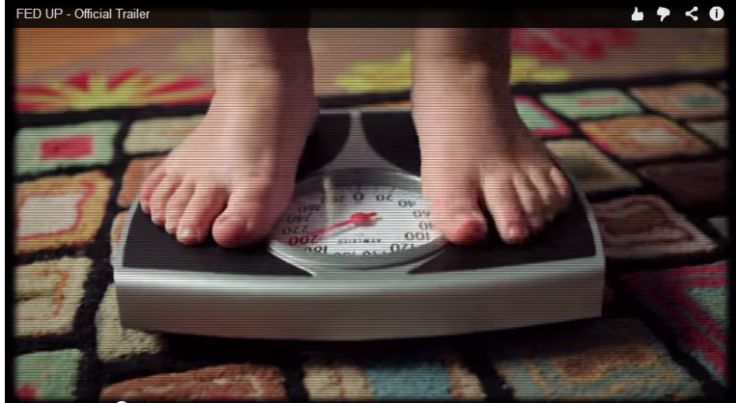'Fed Up' Movie Shows How Big Companies Target Our Nation's Children, Killing Them With Sugar

Would you be alarmed or even a little surprised if you knew that 80 percent of the foods that Americans consume contain sugar? Well, you shouldn’t be, and a new documentary released last weekend explains how and why sugar has been taking over our American diets. The film, Fed Up, produced and narrated by Katie Couric and directed by Stephanie Soechtig shows the ways in which the food industry in this country is targeting and harming our children, by targeted advertising to young children and selling their products in schools.
As I was watching this movie, I became enraged at the thought of being duped for so many years. And while I try to be as conscious as I can regarding what I put into my body, I felt complacent in the fact that I never really bothered to focus on a main component of the Nutrition Facts label — percent daily values.
What are percent daily values? According to the Mayo Clinic, the percent daily value (PDV) on the Nutrition Facts label is a guide to the nutrients in one serving of food. Things like cholesterol, sodium, and total carbohydrates usually have the PDV listed on the column to the right, but if you look closely, you’ll notice that one component of the PDV is missing — the percentage of sugar.
So you might catch yourself wondering if this percentage is just negligible or if it's just an oversight. Unfortunately, it’s not, and according to the documentary, the reason being is that big-named food companies lobbied to get these percentages removed from labeling because the amount of sugar in many American snacks and processed foods well exceeded the recommended amount. Moreover, if you take a look at the Food and Drug Administration’s website, you’ll see under nutrition labels they don’t reference any percentage recommendations for sugar.
According to the American Heart Association, the recommended amount of sugar we should intake on a daily basis should be limited to six teaspoons. Fed Up points out that most people, on average, consume six times the amount. And we find sugar in many unsuspecting foods like "healthy" drinks, yogurts, and especially diet foods.
Fed Up mainly focused on the political side of the food industry, and the experts, like Michael Pollan, equated the sugar epidemic to what the smoking epidemic was 30 years ago. They said when we look back 30 years from now, we’ll wonder how we let ourselves get fooled for so long. Former President Bill Clinton has even warned that if we keep on this downward spiral, our food is going to kill us and our children.
"It's time for a new story, about the food we eat and the environment we want for our children," Katie Couric said during her ending narration. "Fed Up encapsulates what the film wants its viewers to consider and what's at stake if they don't.”
The movie also showed the lives of four obese teenagers struggling to lose weight. Some exercised and tried to stay active, but the temptation for fatty, sugary, and sweet food constantly surrounded them. They tried everything that they could but constantly failed.
One interesting point that I learned was that sloth and obesity are a result of poor eating habits, not the other way around. Many people tend to blame obese children for their own weight downfall, but that’s not the case. It’s like an alcoholic trying to recover from their addiction, but there is a bottle of whiskey constantly in reach. Also, foods that are high in fat and contain a lot of sugar have addictive qualities and can make many people feel lazy and tired.
I think this was the worst part, hearing how the food industry targets our younger generation, making it harder and harder for them to overcome or battle obesity. Schools are supposed to be a safe haven for kids, yet they’re being served breakfast and lunches that are anything but healthy. And a lot of it has to do with companies partnering up and donating money to schools so that their products can be marketed and sold.
Other countries like Mexico, Saudi Arabia, South Africa, and Venezuela also have a high rate of obesity — more than 30 percent of the population is either obese or overweight. The documentary estimates that in 20 years, 95 percent of all Americans will be overweight or obese.
A huge issue with the sugar epidemic is that many people aren’t taking it seriously because they’re not seeing the immediate effects. However, diseases like childhood diabetes and other metabolic diseases are now starting to show in younger children.
Many food industry executives declined to comment when asked about the topic, and the film shows footage of them testifying before Congress that things like soda should be incorporated with the total amount of liquid one should consume per day. Shelley Rosen, former senior director of strategy at the McDonald’s Corp., said with a straight face that Ronald McDonald does not market food to children but rather, “he informs and inspires through magic and fun.” Seem ridiculous? But messages like this, whether overt or subliminal, target children on a daily basis via cartoons, celebrities, and athletes.
The food industry has so much money that they even influence food and health care politics. First lady Michelle Obama through her “Let’s Move!” campaign says that she doesn’t want to demonize any particular industry. But that is exactly what needs to happen in order for there to be change. These food giants — similar to cigarette companies — need to be demonized because they’re killing our children one teaspoon of sugar at a time.



























